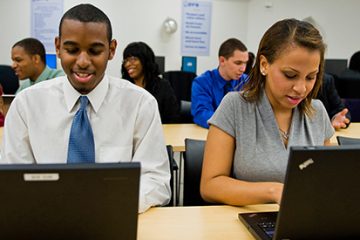A short while ago, I had the chance to interview Andrew Cabasso, a Northeastern alumni class of 2009, and recent graduate of Fordham’s School of Law. Prior to speaking with him, I looked a little bit into his experiences whilst at Northeastern University, specifically with the Social Enterprise Institute where I discovered that, as an Honors Scholar, Andrew developed a thesis on Microfinance as a gateway to poverty alleviation in the Dominican Republic. Voted one of Northeastern’s 100 Most Influential Seniors in 2009, Andrew obtained the Matthews grant through the Honors program to travel to the Dominican Republic for his thesis, working and learning from several microfinance institutions on the ground, including Esperanza, International; during his trip and based off of research conducted upon his return, he collected vital information regarding the state of the individuals obtaining these microloans, as well as a detailed understanding of some best practices for MFI business models. Greatly impacted by his experience in the Dominican Republic, Andrew decided to return with the first trip taken by SEI to the Dominican Republic, where he worked with Esperanza again as well as Fundación San Miguel and formed even stronger relationships with the country and the individuals he met and worked with, returning to complete his thesis (available for reading here).
After his graduation from Northeastern, Andrew knew that he wanted to continue some of the work that he had started in his senior year, and especially in working with the DR populations and the role that law could play in sustainable development. Thus, upon entering Fordham’s School of Law, Andrew sought out different student groups to determine if there was an interest in the existing student population to return with him to the Dominican in efforts to continue the work he had been doing with the communities, as well as to bring in a legal perspective to the Dominican Republic situation he had observed. There, he found a group called Universal Justice(UJ), whose mission was to bring legal aid to developing countries.
Bringing 4 students with him, Andrew partnered with an organization called the Sister Island Project to initially spend some time observing in Cruz Verde and the surrounding communities and learn more about the organizations working in law, development and agriculture in that region. Coming back, Andrew and the UJ students had developed a good understanding about the state of affairs and decided to focus their efforts on a marginalized community called Mata Los Indios, which was a population 80% of Haitian descent, although the majority of the individuals were born in the Dominican Republic. The goal was to work on private land rights and immigrant rights issues in this community, addressing their two major obstacles to improved livelihoods: an inability to own and thus farm on the land they lived on, and an inability to provide schooling for their children past a certain age since DR laws required identification cards unobtainable to this population due to their family history.
Following that experience, Andrew returned with 8 students the following year, meeting with NGOs, lands rights lawyers and a senator in the Dominican government. He continued to work with this organization, following up on his experiences at Northeastern, whilst developing his law degree at Fordham University and exploring different ways in which law can be applied to a variety of subjects, from international development to jurisdiction in virtual worlds. His first year, he also participated in a Leitner Center for International Law and Justice Fellowship Program where he obtained funding to work with Grameen America, the US branch of Grameen Bank (an MFI originally founded in Bangladesh by Muhammad Yunus). In addition, he established a bank branch with Esperanza International called Ingenio Consuelo which, since its creation in 2009 has provided 41 loans to Esperanza borrowers in 8 different communities, with the majority in San Pedro de Marcoris.
Currently, Andrew has just graduated from Fordham and is practicing law in New York. He continues to advise the Universal Justice group at Fordham —they are returning the Dominican Republic this year after recently partnering with Northeastern University to work on sustainable development projects in Mata Los Indios— and is focusing on developing his law career.


